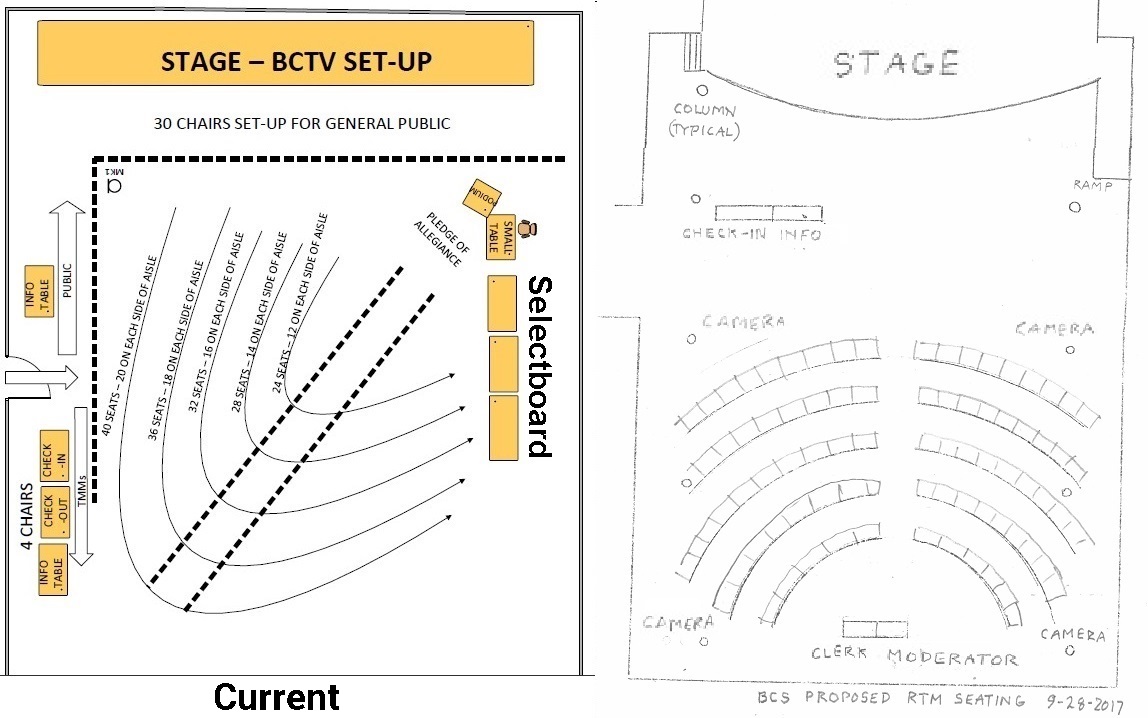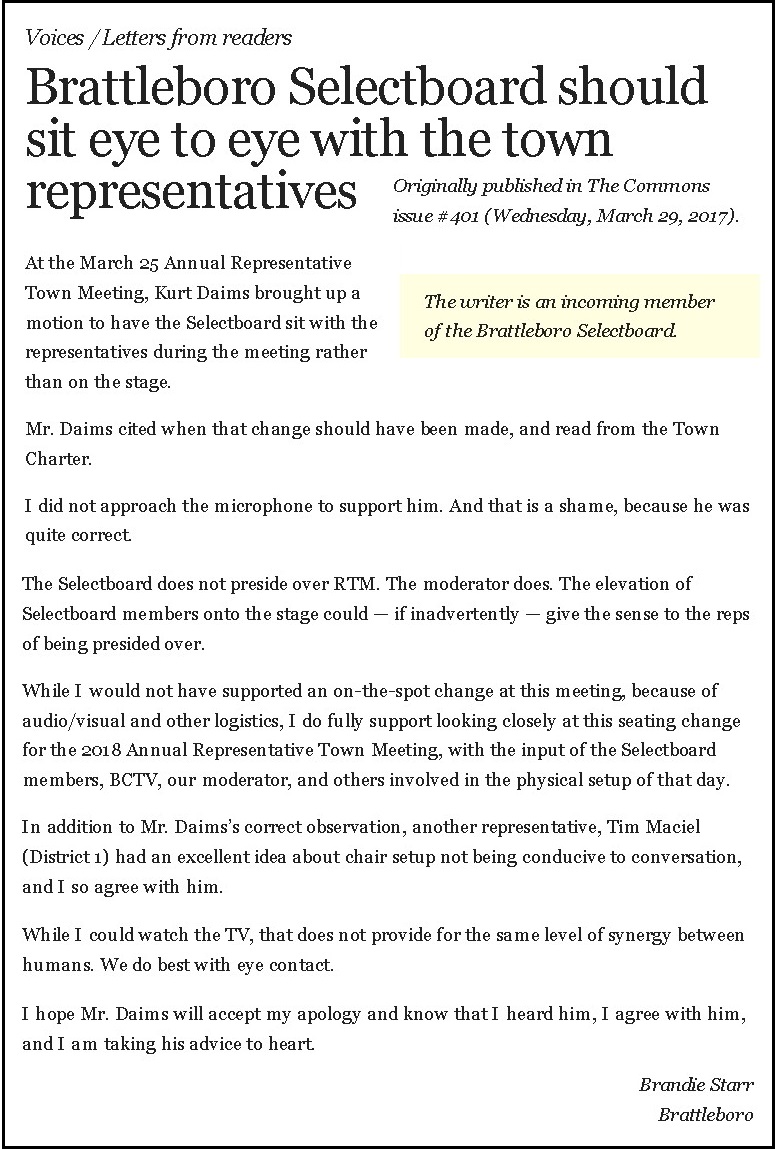Brattleboro Common Sense is on a continuous mission to expand democratic rights and participation in town government, through both large-scale and small-scale reforms, all of which are equally important to the cause.
REPRESENTATIVE TOWN MEETING: Taking its rightful place
Representative Town Meeting (RTM) is the most directly democratic and widely representative governance body of town government. It should be designated, operated and respected as the Town’s primary legislative body, and should exercise full agency over its own affairs and process.
• Immediate Necessity: Vermont’s Act H.947 states that a town’s “legislative branch” can pass a budget and municipal tax rate if an “annual or special meeting” has not been held to do so due to COVID-19. Brattleboro’s Selectboard assumed the identity of “legislative branch” and acted accordingly. This usurpation must be undone, the Selectboard must be blocked from acting as such, and the Town must be removed from operating under the terms of H.947.
• An article must be brought before RTM that changes the designation of the Selectboard as the primary Town legislative body to bestow that designation on RTM.
• Currently, the RTM agenda is set by the Selectboard. A mechanism must be created whereby Town Representatives arrange the RTM agenda.
• In the Town Charter, RTM is “a source of ideas, proposals, and comments… It exercises exclusively all powers vested in the voters of the Town”… Yet all of the substantive proposals brought to RTM are slotted at the very end of the agenda, after the meeting has run for some several hours. These proposals must be brought to the front of the agenda, instead of prioritizing items that reflect the Selectboard’s priorities.
• Town Representatives have the power to call a referendum on any item after a final vote has been taken. Currently, that referendum authority is being blocked by a nonsensical interpretation of the rules, which asserts that any such referendum must have advance warning, even though such a referendum would be a reaction to a result that is unknown until it occurs during the meeting.
• On the town’s website, Representative Town Meeting is a subsection listed under “Boards and Committees”, whereas the Selectboard has it’s own menu category. RTM must be brought forward to the main menu.
REPRESENTATIVE TOWN MEETING: Physical Dominance of the Selectboard
Nothing exemplifies the undue influence of the Selectboard more than their physical dominance over the Town Representatives and observers during the meeting. It is in fact the aspect of the meeting from which all such inequality flows.
Before Representative Town Meeting (RTM) was created, the Selectboard presided over voters at town meeting, as it still does in all other Vermont towns. The office of Moderator was created to take that duty at Representative Town Meeting.
But by tradition and ignorance of the law, the Selectboard kept its preferential treatment. Their position at the front of the meeting gives them greater comfort, visibility, access to the Moderator, and disproportionate opportunity to speak than the other members of the body.
In short, the architecture of the meeting creates a two-tiered system that turns the great majority into second-class members and mere followers of the Selectboard.
Read BCS Director Kurt Daims’ full essay with Town Charter history and citations.![]()
BCS Director Kurt Daims proposed the following seating reform in 2017.

The proposal received a public endorsement by then-incoming and currently serving Selectboard member Brandie Starr:

PETITION REFORM:
Immediate Necessity: COVID-19 has suppressed the ability to collect in-person signatures for petitions. A change must be made to allow for electronic signatures, under whatever verification measures deemed appropriate. Brattleboro’s town government has concluded that they do not have the authority to make such a change. The state government is considering the enabling of such signatures.
In 2010, BCS succeeded in a lawsuit to prevent the Brattleboro Selectboard from “censoring” valid petitions (voting down petitions instead of automatically forwarding them for a vote).
In 2012, however, during a revision of the Town Charter, procedures were amended to circumnavigate around that victory. The changes allow Representative Town Meeting – where many petitions are forwarded – to censor them.
It also radically restricted the time period for voting on such measures, either at RTM or on an election ballot, from 365 days a year to only 1 day: Town meeting day. Many measures will be moot by the time that day comes around.
These changes make Brattleboro stand alone in restricting democratic rights to those degrees in the state of Vermont.
ACCESS TO SELECTBOARD MEETINGS:
Remove or compensate for barriers to participation, especially for families. Child care, and rides to and from, are just two participatory mechanisms that should be required. Staggering the days and times of meetings is another.
And how about filling the absurd amount of empty space in the room with chairs for the public, instead of crowds having to cram into the vision-blocked back room (which would be much better used for child care!)
YOUTH EMPOWERMENT:
In March 2019, BCS’s Youth Vote campaign was victorious in gaining 69% of town residents’ vote on a ballot measure to amend the town charter. The amendment gave residents aged 16 and 17 the right to vote in town elections, run for and serve as Town Representatives, and to run for and serve as school board directors.
The charter amendment is currently working its way through a ratification process by the Vermont legislature. The school board provision had to be struck from the amendment because of the recent consolidation of school districts that eliminated the two boards specified in the measure. BCS will undertake another campaign to replace the provision to empower youth to serve on the new board.
LIBERATE VOTING DAY:
Full-operational weekend voting; mandatory paid work leave for voting.
“Please Comment Below on These and Add Your Ideas for Democratic Reforms!”
